We help farmers and ranchers find science-based solutions to today's biggest sustainability challenges. Through interdisciplinary research, partnerships with expert farmers and other agricultural professionals, and innovative communication, we identify ways to conserve and regenerate critical natural resources while maintaining agricultural productivity at the farm, regional, and state level.
Energy and climate footprinting
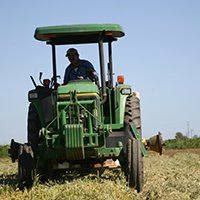 Does it require more energy to produce tomato sauce in California and ship it to consumers all over the U.S., or for consumers to buy tomato sauce produced in their own region?
Does it require more energy to produce tomato sauce in California and ship it to consumers all over the U.S., or for consumers to buy tomato sauce produced in their own region?
How can beekeepers reduce the greenhouse gas emissions associated with honey production and crop pollination?
Every stage of the food system — production, processing, distribution, retail, preparation, and waste handling — has greenhouse gas emissions associated with it. Developing a sustainable food system requires a cradle-to-grave accounting of the benefits and impacts all along the food supply chain.
By gauging the footprint of agricultural products, growers and distributors can clearly understand where emissions are highest and lowest, and how to focus emission reduction at points of greatest possible impact.
Farmers focused on reducing GHG emissions are not only improving their energy efficiency, they are positioning themselves for a budding California carbon market and an increasingly climate-smart consumer market.
Through SAREP’s Energy and Climate Footprinting work, we assess the entirety of the food production and supply chain to identify energy and emissions "hotspots", evaluate the impacts of new practices and technologies, and assess trade-offs between interventions at different stages of the supply chain for selected categories of foods.
Project Portfolio
-
Greenhouse gas emissions and energy use in California orchards
-
Comparing the energy footprint of local vs. long-distance produce
-
Environmental impacts of California tomato cultivation and processing
Sustainable management of nutrients and water
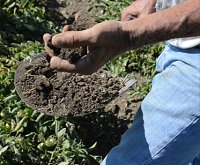 Many of the most pressing environmental and economic sustainability challenges faced by California agriculture in the 21st century stem directly from the dynamics of nutrient flows and water use on our farms.
Many of the most pressing environmental and economic sustainability challenges faced by California agriculture in the 21st century stem directly from the dynamics of nutrient flows and water use on our farms.
Nitrogen, an essential nutrient for crop growth, is increasingly known to negatively impact California’s ground and surface water resources. Farmers are facing growing pressure to increase efficiency of nitrogen use, and policy makers are grappling with how to ensure long-term water quality while protecting the viability of California’s farmers.
California’s extreme drought conditions have put major stresses on farmers as well as on groundwater resources. Sustainable water management will require maximizing efficiency at the farm level, as well as regional and statewide management plans that seek to protect agriculture as a vital California resource.
SAREP works to link researchers and the agricultural community to inform policy, co-create management solutions that are grounded in scientific research and acknowledge the trade-offs farmers face when making farm management decisions.
Project Portfolio
Harnessing ecosystem services for agricultural sustainability
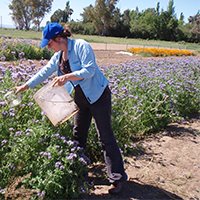 More and more, we are realizing the value of healthy ecosystems for agriculture. Biodiversity in soil, pollinator habitats on farm, and restored ecosystems surrounding farms can help build productivity on farms and decrease their susceptibility to pests and disease. Healthy on-farm ecosystems can also play a role in providing services outside of agriculture, such wildlife habitat and groundwater quality.
More and more, we are realizing the value of healthy ecosystems for agriculture. Biodiversity in soil, pollinator habitats on farm, and restored ecosystems surrounding farms can help build productivity on farms and decrease their susceptibility to pests and disease. Healthy on-farm ecosystems can also play a role in providing services outside of agriculture, such wildlife habitat and groundwater quality.
Managing farms and agricultural landscapes to build and use ecosystem services is an essential component of sustainability. Better incorporating agriculture into natural ecosystem functioning will improve agriculture’s resilience in the face of the long-term uncertainty of resource availability and climate change.
Often, the science of ecosystem services is complex and can be difficult to operationalize.
Our projects help build understanding of the benefits of ecosystem services and seeks to promote practices that enhance ecosystem services.
Project Portfolio
- Agroforestry
- Alternatives to Methyl Bromide
- Biologically Integrated Farming Systems (BIFS)
- Cover Crops Database
- Earthworm information
- Elderberry as a Hedgerow Crop for California Farms
- Organic farming research and information
- Teaching soil health
Closing the Loop: Sustainable waste management in agriculture
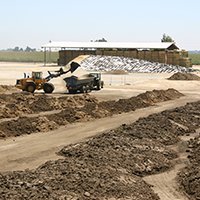 One man’s trash is another man’s treasure. Or in the case of agriculture, one cow’s manure is one farmer’s treasure. Agriculture has the potential to incorporate not only agricultural wastes, but also urban and industrial wastes close the loop and allow wastes to become fuel for food.
One man’s trash is another man’s treasure. Or in the case of agriculture, one cow’s manure is one farmer’s treasure. Agriculture has the potential to incorporate not only agricultural wastes, but also urban and industrial wastes close the loop and allow wastes to become fuel for food.
Project Portfolio:
-
Russell Ranch biochar research
-
Using orchard biomass for energy production
Responding to climate change
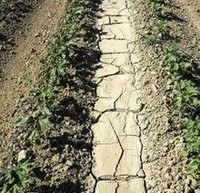 How climate change will impact specific regions is still debated by scientists. In California, some scientists predict that changes in temperature regimes will likely affect important crop-specific variables like chilling hours and evapotranspiration rates, requiring geographic shifts northward in Central Valley cropping systems. In addition, water availability throughout the West is predicted to decline due to decreases in the mountain snowpack and earlier spring runoff, with important implications for irrigation capacity.
How climate change will impact specific regions is still debated by scientists. In California, some scientists predict that changes in temperature regimes will likely affect important crop-specific variables like chilling hours and evapotranspiration rates, requiring geographic shifts northward in Central Valley cropping systems. In addition, water availability throughout the West is predicted to decline due to decreases in the mountain snowpack and earlier spring runoff, with important implications for irrigation capacity.
Our work will focus on identifying adaptations and mitigations needed in agriculture to respond to climate to change, from the farm to the regional and statewide scale.
